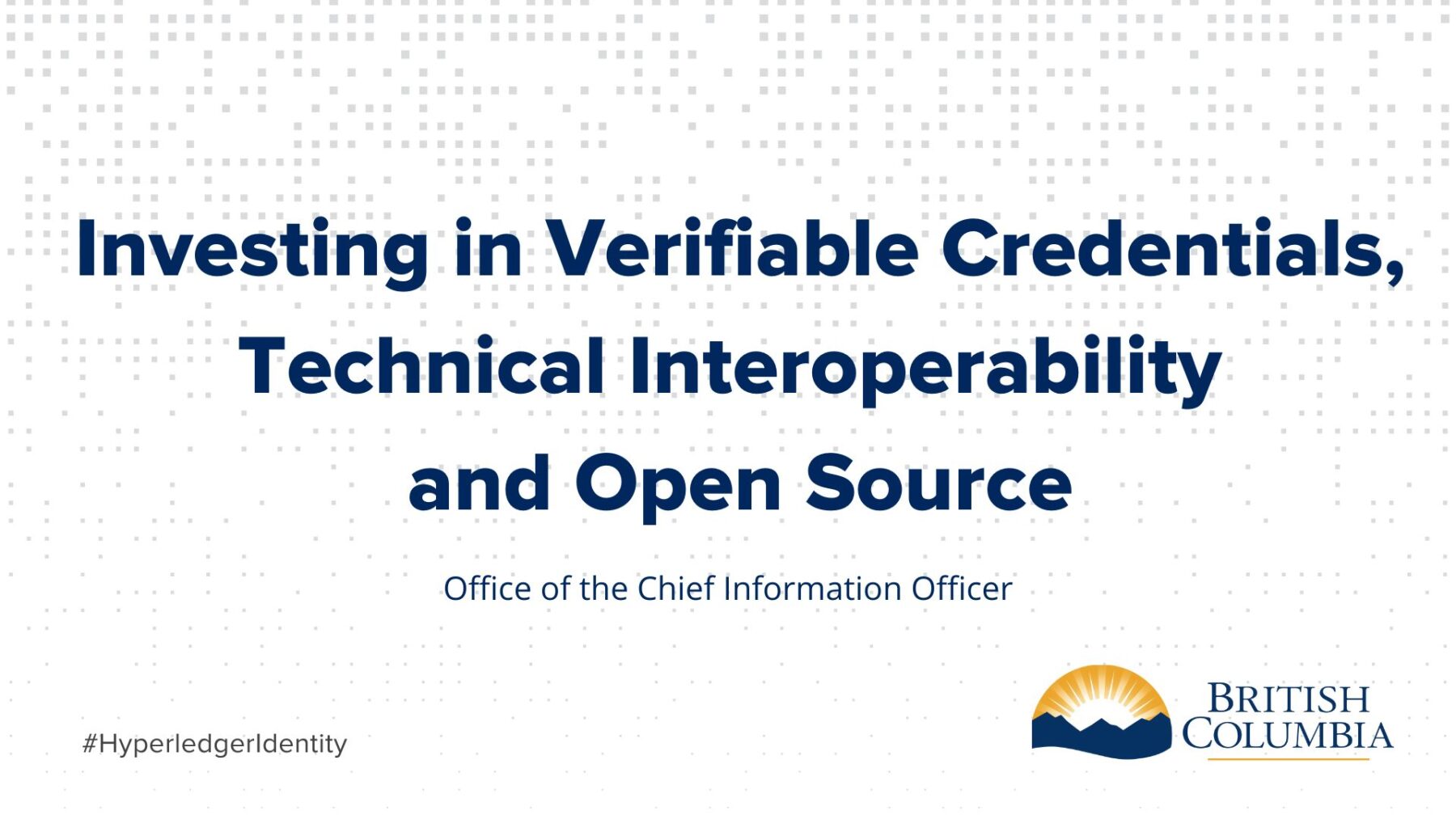Investing in Verifiable Credentials, Technical Interoperability and Open Source

Our 20 Year Journey
Like many provinces and territories in Canada, British Columbia (BC) has a long history of providing secure access to online government services. We started our journey 20 years ago with the introduction of BCeID, a simple username and password solution. A lot has changed since then!
Today, we are investing in Verifiable Credentials (VCs) and a digital wallet. We see these as the cornerstones in the evolution of our digital strategy, adding a much needed layer of trust to the digital economy.
We want to share what we are doing, why we focus on interoperability and open-source, and why we are excited about VCs being our natural next step.
Why We Care
As a public sector organization, BC has a strong interest in seeing the adoption of technologies that are secure, privacy-preserving, and convenient.
Digital is obviously everywhere. In 2021, 94% of BC citizens said they are online, and 90% of Canadians have smartphones. Also, according to the Business Council of Canada, in the last decade Canada’s digital economy grew 40% faster than the overall world economy. In Digital ID terms, this growth is an opportunity to make people’s online lives easier and safer.
We also know that cybersecurity threats are growing and there are no signs of it slowing down. BC sees an astonishing 496 million unauthorized access attempts per day – that’s 5,741 every second! Identity theft and fraud also continues to rise. We need digital trust solutions that counter this increasing risk.
In responding to this new reality, we recognize that people are familiar and comfortable with the many credentials that governments issue today. Things like physical copies of drivers’ licenses, health cards, passports, permits, and reports are widely accepted and trusted. In BC, we are building on that trust and moving towards providing the same things digitally. We are also enabling confidential connections through the wallet to give people choice and confidence in their digital lives.
BC’s Approach
Clearly, digital trust goes far beyond just the government. Canadians expect more access, with greater security, to high-value services in both the public and private sectors. VCs and the wallet provide a highly flexible way to achieve that goal.
Collaboration is critical to achieving that goal and it’s important to us. BC’s Chief Information Officer, CJ Ritchie, strongly advocates for us working together to meet the expectations of Canadians. She notes, “If we don’t all act together to deliver solutions that protect privacy and interact securely, trust will erode and there will be negative impacts for businesses, people’s livelihoods, and the broader digital economy.”
As our approach evolves, we also remain keen to support open source solutions that interoperate with other national and international efforts. There is no dominant design yet, no one network or technology, so we must remain nimble and flexible in our exploration. We also need to coexist with existing identity solutions that millions of British Columbians already rely upon.
Technology Interoperability
In exploring VCs, BC is contributing to solutions that allow agents to verify credentials from multiple networks. Indeed, through one of our Code With Us initiatives, DID indy, we contributed over 11,000 lines of open-source code to support and prove the viability of a “network of networks”.
We also are focused on the interoperability of Hyperledger Aries agents themselves, another key success metric. We are leading contributors to Aries Agent Test Harness (AATH), open-source software that runs a series of Hyperledger Aries interoperability tests and delivers the results to the AATH website. Great interoperability requires that we test—and re-test!—that interoperability on a regular basis.
__
Side note: If you want to test the interoperability of any Aries agent with this ecosystem, please sign up to join the Hyperledger Aries Interoperability Event on August 31.
__
Driving Adoption
In BC we have a lot of technical skill in working with VCs and with Hyperledger Aries agents. However, for VCs to be successful, it needs to be easy for others to join in.
On the agents side, to complement our extensive contributions to Hyperledger Aries Cloud Agent Python (ACA-Py) and other Aries and Indy projects, we also contribute to Hyperledger Aries Framework Javascript (AFJ), the agent commonly used for mobile digital wallets.
That’s why, when thinking about mobile digital wallets, we opted to contribute to the Hyperledger Aries Bifold project, helping it also essentially become “Bifold as a framework”. Bifold uses AFJ, and BC and others can use it to easily deploy a custom-designed digital wallet. Jurisdictions within Canada and elsewhere in the world are already taking this approach for their own wallet explorations. It’s an open-source stack right the way down.
VC adoption will be helped by a thriving open-source community, and we are giving back wherever we can.
Open-Source Success
We believe the community’s success becomes our success. For years we’ve been committed to open-source, interoperable solutions in this space. Our approach is always evolving, but our contributions and commitment to various digital trust open-source projects and technologies continue.
We hope that even more organizations will join in and contribute. Our goal in BC is a new layer of trust for the internet, making it easier for people to work and play online with confidence.
